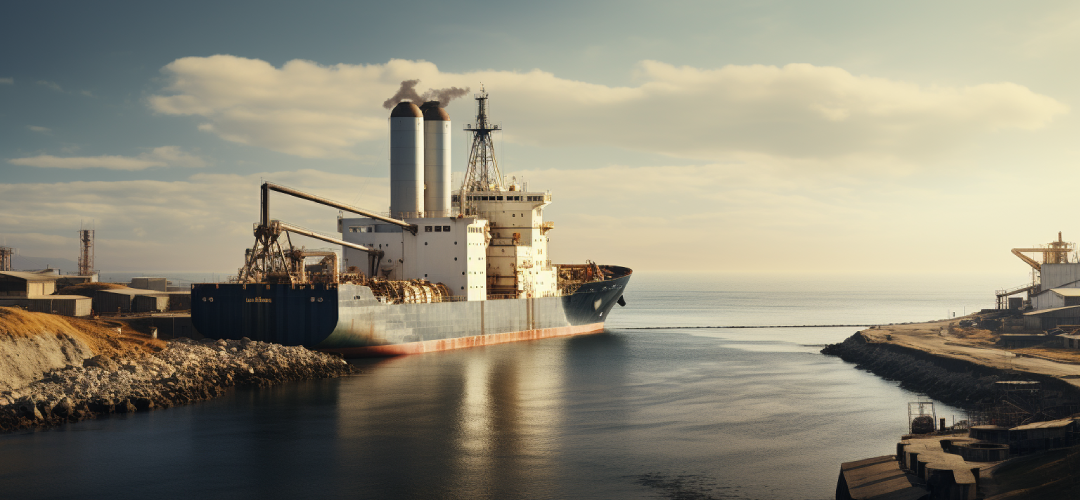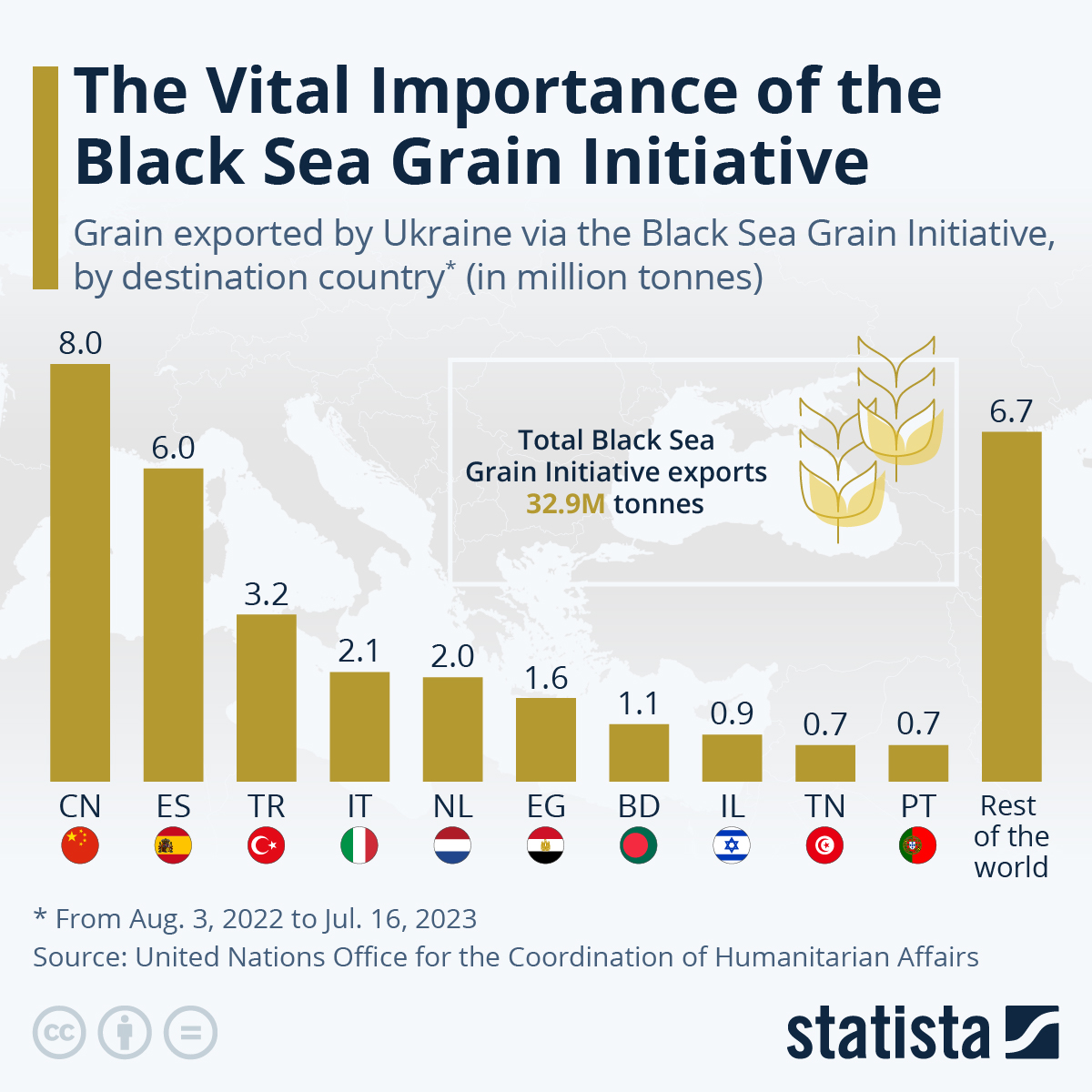Choking the World’s Food Supplies!
July 29, 2023 | Expert Insights

Food security is one of the most basic human requirements. Most of us take this need for granted. But in large parts of the world, this is not the case. Here the continuous daily supply of food is a luxury that few can afford. Domestic production is not enough to meet these needs. Dependence on the outside world is a necessity. When this outside supply stops abruptly, it is a calamity of humungous proportions.
It is well known how the war in Ukraine exacerbated an already delicate food situation in the Global South. While much of the year, good sense prevailed, and a small measure of affordable Ukrainian grain flowed to the Global South thanks to the Black Seas Grain Deal, helping to alleviate food prices and scarcity in much of Africa and parts of the Middle East. Unfortunately, this, too, has now come to an end once Russia was inflicted pain by the punishing Ukrainian strikes on the Kerch bridge, the only road link between Crimea and the Russian heartland.
As per media reports, wheat futures in the Chicago Stock Market shot up by 11 per cent once it was clear that the deal would not receive any more extensions. And this is just the beginning.
Background
The signing of the UN-brokered "Initiative on the Safe Transportation of Grain and Foodstuffs from Ukrainian ports" in Istanbul exactly one year back (22 July 2022) was greeted with much relief by most of the world. The deal allowed for the shipment of food and fertilisers from the Ukrainian ports of Odesa, Chomorsk and Yuzhny in the Black Sea to ports in Türkiye for onward dispatch to all over the globe.
The UN projected the grain deal as a great success, with the FAO claiming that food prices dropped as much as 23 per cent from their peak in March 2022 soon after the invasion, with over 45 countries on three continents benefiting from the grain supply.
However, the Russian consent was grudgingly given as Moscow felt that the deal tilted heavily in favour of Ukraine. Yet it was extended thrice, with the last extension ending in May. Now Moscow has put its foot down, refusing to ratify it any further and has issued an open threat to any shipping heading towards any Ukrainian ports. President Zelensky, not one to cower down, proclaimed a similar threat to any shipping heading to Russian Black Sea ports.
Land routes exist from Ukraine to other European ports, but no land transport system-road, rail or riverine, can haul the volumes involved at the cost that makes them affordable to low-income countries. Furthermore, the time taken would add to the cost and quality of the grain reaching the end of the supply chain.
For some time, Russian complaints have been that the deal has done little for its agricultural economy, and all the benefits have gone to Kyiv. Now it has given its wish list to the UN- restoring SWIFT for Russian Agriculture Bank, lifting restrictions on maritime insurance on the import/ export of Russian agriculture machinery/spares and ending sanctions against Russian fertiliser producers etc.
Mr Antonio Guterres, the controversial UN Secretary-General, blamed Moscow for its decision which, he claims, will end up with “millions of people facing hunger, as well as consumers confronting a cost-of-living crisis.’ Mr Guterres further claimed that he had sent proposals to the Kremlin to “facilitate Moscow’s demands” but Mr Putin has not responded.

Analysis
The story of the grain fight revolves around the age-old contest over control of shipping lanes in the Black Sea which Russia considers it's near abroad. The Black Sea is of equal geo-strategic significance for Ukraine. It is Kyiv’s outlet to the outside world and the route for supplying cheap grain to the world from its bread basket.
There is a third power in the Black Sea- Turkey, which controls the mouth of the Black Sea to the outside world through the Bosporus Straits. Without the consent of all three parties, nothing can flow out of the Black Sea despite the best efforts of the strongest naval power in the world, including the United States. This is a harsh reality that the entire global community acknowledges.
In this triangle, Ukraine finds itself trapped with its huge grain harvest rotting in underground storage shelters with no customers in sight. Agriculture is a principal pillar of the Ukrainian economy, and as per the German media outlet DW, Ukraine accounts for 10 per cent of the world wheat market, 15 per cent of the corn market, and 13 per cent of the barley market. With more than 50 per cent of world trade, it is also the main player in the sunflower oil market. So, it is not as much the concern for ‘feeding the starving millions of the world’ that is driving President Zelensky’s zeal to get yet another extension to the grain harvest deal under the aegis of the UN, but sheer economic survival.
In the highly competitive commodities market, many countries are ready to step into the vacuum left by Ukraine. Argentina, Australia and even Canada/ U.S. could spike their grain production to take advantage of Ukraine's absence from the grain supply chain. Brazil's maize supply has seen a hike of over 30 per cent in 2022-23 at the cost of Ukraine. However, transportation costs from the Americas and Australia raise the cost of the grain, making it less attractive to the Global South, while India, another big grain producer, is reluctant to dent its strategic food reserves as a hedge against monsoon failures.
The control over the Black Sea shipping lanes stems from the Russian occupation/ annexation of the Crimean Peninsula since 2014, an aggression that remains largely unrecognised by the international community and the UN. There is little hope for Ukraine to snatch back the Peninsula by force of arms because the Russian Army has had almost a decade to fortify its defences, making any large-scale assault suicidal.
Ukraine lacks the naval power to force a passage through the Black Sea for the grain-carrying ships, and even if the Russian Navy does not conduct direct interdiction, it has laid extensive minefields making navigation an extremely hazardous exercise even with Russian concurrence. Ukraine has sowed its own sea mines to keep the Russian Navy and amphibian forces away from its shores.
So, with both protagonists in a Mexican Standoff, the world can say goodbye to cheap grains, at least for the immediate future and till better sense prevails. Russia has further raised the stakes by incessantly bombing the port installations of Odesa, the hub of grain supply and destroying vast quantities of grain stocked for shipping.
The planet can live with shortages of energy supply for a limited period of time. However, the same logic cannot be applied in the case of food supply. So, when the war in the Black Sea disrupted Ukrainian food exports, a solution was sought by the international community, with the help of the UN and the offices of President Erdogan.
The long-term impact if Ukraine remains cut off for extended periods is more worrying for the international food supply chain. Global demand for grain is rising as corn is being used to manufacture biofuels, especially by big suppliers like the U.S. and India. If Ukrainian farmers stop planting fresh crops as their storage capacities are already overflowing, global wheat stocks would quickly dwindle, making a food catastrophe a clear possibility in the medium term.
What has been missed out in all this is that you cannot hope to strike a blow to an economy like Russia's without expecting some kind of blowback. Russia is painfully suffering under the strict sanction regime. Its ships have to be checked and double-checked. They can be boarded anytime by hostile powers. Even traditional customers think twice before doing business with a sanctioned country as they do not want to be on the wrong side of supra-national institutions like the World Bank and the IMF, which the United States and the Western European countries control.
Ukraine, on the other hand, is in a totally different situation. It is already receiving massive economic assistance from the West, more than any other war-torn country in the world. This is despite the extremely high levels of corruption allegedly rampant in the country. Any loss that it suffers due to reduced exports will be suitably compensated. The World Food Program is collecting Ukrainian supplies separately to assist the planet’s poorest countries. In all this, the advantage it has over Russia is that it is not a sanctioned country. So, when this deal was active, Ukrainian ships sailed smoothly to and from their destinations while Russian ships were mostly stuck in ports due to bureaucratic deadlock. Russia has officially stated that it will continue to supply the world’s most deprived countries with foodgrains in its own way despite the expiration of this deal.
Assessment
- The world needs to come together to solve this issue instead of each side carrying out point scoring. Else a catastrophic famine will stalk the poorer corners of the globe.
- The grain deal was decidedly unfair to Russia, and no one expected it to endure. Russian and Ukrainian exports of food grains and associated materials must be equally balanced so neither side gains the edge. Russia has genuine grievances that must be addressed before a new deal can be cobbled together.
- The worldwide impact of the Russia-Ukraine war was supposed to be contained. Now it has once more spread in the most horrible way. This might have an impact on the future course of this conflict.








Comments